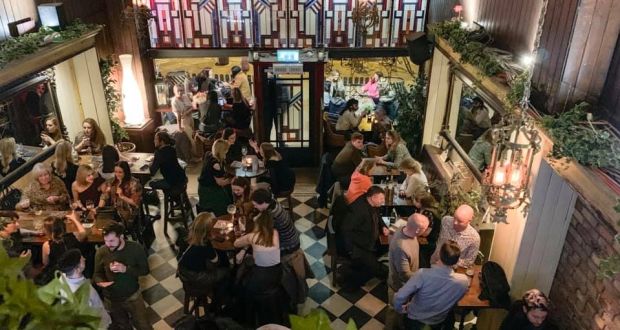
People come to Pattaya to socialize and not to distance socially. In the jargon, our beach resort has a “contact culture” or, in the words of the radio station, is “the city of fun”. Not at the moment, of course, with the Corona virus in charge. We can’t simply keep calm and carry on in an environment where it is unthinkable to be within two meters or six feet of the next person.
While everyone waits for the miracle vaccine, the owners of restaurants, bars, nightclubs gymnasia and theatres – all currently closed – are scratching their heads to think of solutions. Restaurants are the easiest to deal with in this context. They could require staff to wear masks and gloves and customers might have to collect their food and drink from a nearby table rather than expect the waiter to put the plate or glass under their noses.
Obviously, restaurant tables would have to be spaced well apart and patrons tested for temperature at the door and required to use a spray or gel. Owners will grumble that their profits would take a dive with fewer on-site sales, but many would likely accommodate to new rules. Taking advantage of new technology, such as the use of QR code-based ordering to replace menu cards, would reduce interaction with staff and is likely to mushroom.
Transvestite shows, mass sports events and boxing stadiums – specialties of our particular house – are going to need new technology in the long run. Reducing seat numbers won’t be enough. So there are already in existence pandemic drones and CCTV cameras using ultra-high frequency radio signals which can measure social distancing as well as detecting fevers, heart rate and other vital signs. Surely, that kind of information by enforcement drones can become a part of the apparatus of a police state. Such solutions may seem fantastical right now, but are bound to be on the future agenda unless we are very lucky indeed and Covid-19 disappears permanently in a few months as suddenly as it appeared. Not likely.
Pattaya drinking bars have grown fewer in number in recent years as rents have remained sky-high. Some will never reopen after the Coronavirus epidemic as the volume of traditional visitors seeking bachelor holidays continues to slump. The smaller and cheaper single-unit drinking bars may survive if they can adopt some the more obvious social distancing measures. Neighborhood bars, which have a small group of regular drinkers seeking conversation and harmless bonding rather than more exciting entertainment, have perhaps the best chance of survival.
Traditional nightclubs pose a problem in Pattaya as everywhere in a post-pandemic world. They are based on dance culture, escapism, unbridled fun, alcohol consumption and sexual signaling. Many people actually enjoy being bumped by strangers on a crowded dance floor which is not exactly what social distancing is about. Presumably, the main hope is a vaccine or the latest technology that requires you to wear a cumbersome hat which emits an unpleasant loud noise if you come too close to another human being. It doesn’t sound inspiring. Alternatively, virtual clubs are booming on the videoconferencing app Zoom. Virtual dance parties and livestreaming by six DJs at a time are increasingly popular on the internet. By all means take a peep.
The crucial point is that new technology has always shaped human life and will continue to do so. In the nineteenth century, mass-mail public systems and the introduction of the telephone revolutionized global human communications by reducing the need for face-to-face meetings. During the current lockdown, the internet, mobile phones, social media and Netflix are proving to be lifelines to battle the obvious problems of isolation and loneliness.
Former generations knew a thing or two. The first quarantine in history was described by Leviticus in the Bible: lepers were compelled to dwell alone. In the eighteenth century, the Italian ruler of Ancona constructed an artificial island where plague sufferers were housed. Most spectacularly, the diarist Samuel Pepys pondered how to avoid the epidemic haunting London. He suggested drinking cow urine and cognac whilst holding your nose, to be followed by smoking tobacco. He also suggested not changing your wig lest the new one had been crafted from the hair of someone who had recently died in agony. But at least, he didn’t recommend consuming or injecting disinfectant, did he?




